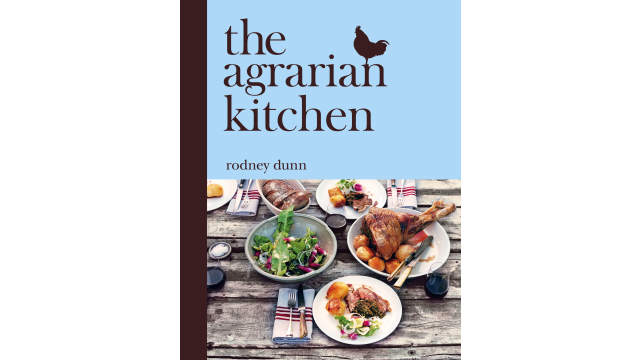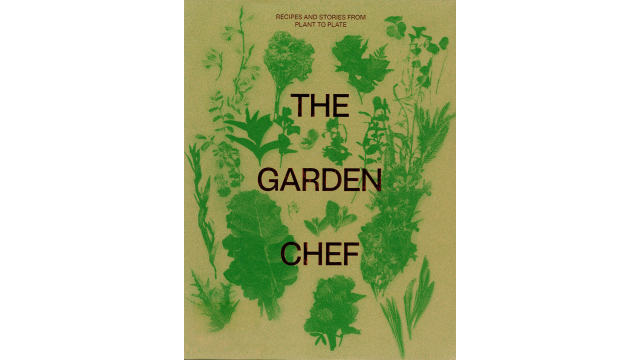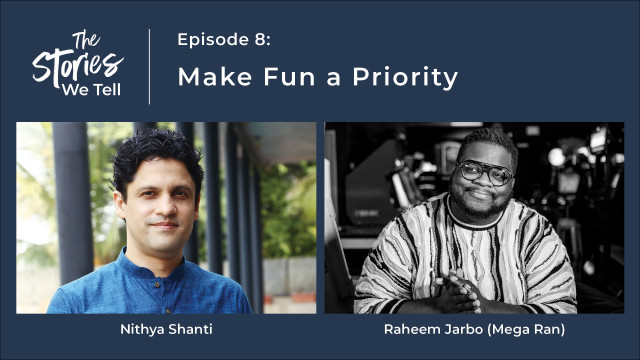Q&A with Rodney Dunn

Rodney Dunn’s passion project is featured in The Garden Chef, an anthology of 40 renowned chef-gardeners from around the world. And that project started off as The Agrarian Kitchen, a cooking school located in Lachlan, Tasmania, Australia that he co-founded with his wife, the equally involved Severine Demanet in 2008.
The Agrarian Kitchen now functions as a restaurant, kiosk, cooking class, and kitchen garden committed to mindful practices around food. Dunn has received global praise for his organic approach to cooking and his efforts to educate others about the importance of supporting local agriculture and food systems.
Dunn was a boy with a hearty appetite and love for food. He started his work life in Sydney as an apprentice under Tetsuya Wakuda, the renowned Japanese-Australian chef at his restaurant. Soon he branched into food media as a recipe developer for many Australian food magazines and later as food editor of Australian Gourmet Traveller in Sydney. His move to Tasmania to build his own farm and restaurant and write his cookbooks with his wife was “borne from a longing to connect back to the earth, ” cooking with fresh ingredients from a garden.
Dunn confesses to harboring a healthy obsession about cookbooks and his own, The Agrarian Kitchen about the art of eating well features recipes that showcase the best of local and seasonal ingredients and details about his life in Tasmania, building a life of wellbeing around food. It’s a charming telling of Dunn’s life and work which seamlessly moves from garden to class and kitchen to kiosk, while raising a family in an idyllic environment surrounded by farm animals, plants, and herbs amidst seasons of “mists and mellow fruitfulness.”
Australian cooking practices are diverse and influenced by a variety of cultural traditions, including Indigenous, British, Asian, and Mediterranean cuisines. A big part of it is a focus on fresh, local ingredients and a fusion of flavors that find themselves very much present in The Agrarian Kitchen.
Roundglass Food: What was the primary idea behind starting The Agrarian Kitchen School and Farm?
Rodney Dunn: I had been living in Sydney for a number of years and in my career as a chef and a food writer it had always been about seeking out the very best flavors . I remember watching Hugh Fearnley-Whittingstall’s River Cottage television series for the first time, where he moved to the countryside and grew his own food. It was like everything clicked into place. The best flavors were always going to be found at the source. Although the move was a large part for myself to be able to experience, I also knew that the best experiences are always better when shared. My greatest joy is found in sharing the joy of cooking and eating the very best food from our garden.
I love to be inspired and in turn be able to inspire others to begin their own journey, that doesn’t mean that everyone should do what I have done, but it is important that we all take responsibility for what food we spend our money on. Support the small local producers where possible, boycott the overfished species, and avoid large industrial farms that are damaging our environment.
RG: What part did the location play in forging a connection with the Earth?
RD: Tasmania is a very special part of the world. When my wife Severine and I were looking to move away from the city there was a strong pull to this island. We searched a few locations in the south part of the state (Tasmania) and in the end it was historical buildings that brought us to the Derwent Valley. Firstly, to The Old Schoolhouse in Lachlan where The Agrarian Kitchen cooking school began then to the Bronte building in New Norfolk’s historic mental asylum where the restaurant began, and the cooking school has recently moved to. The Derwent Valley has had a long agricultural history so it’s nice to tap into that and build upon it.
RG: Name the sustainable practices that The Agrarian Kitchen follows religiously.
RD: Composting: all of the organic matter we use at The Agrarian Kitchen gets turned into compost to be used in the garden, whether it be vegetable scraps, eggshells, oyster shells, or paper towels. We estimate this is saving around 12 tons of waste from landfill each year as well as providing fertility for the garden.
No Dig Gardening: our garden is a no-dig garden; by not turning the soil we are providing a perfect environment for fungal networks to establish. The fungal networks which in turn help mine minerals from the soil and exchange them with the vegetables for sugars from photosynthesis.
Staff welfare: Restaurants are notorious for long hours. At The Agrarian Kitchen we regard the sustainability of our human resources as highly as the rest of our sustainability practices. All our full-time staff work a 38-hour week over the course of four days, giving them a three-day weekend in which to pursue other aspects of their lives. This results in less staff turnover and in peak seasons. We often have ex-staff members returning for work when we are short-staffed.
RG: Conversations around health and nutrition are growing louder each day. How can restaurants bring these principles to play in their businesses?
RD: Firstly, the traditional western restaurant meal of a large piece of protein lightly garnished with a few vegetables is very outdated. It is neither good for the planet or good for the diner. I would urge more restaurants to incorporate more vegetables into their menus. The other side of this challenge is to educate the consumer, who has long misunderstood a large chunk of meat to represent good value. Vegetables are every bit the equal to their meat counterparts and at the end of the day very important to eat in a more harmonious balance than is currently the norm.
Don’t get me wrong, I am an omnivore who enjoys eating meat. We just need less and eating it with a balance of quality fruit and vegetables is always more enjoyable and I feel a whole lot better for it. When I am away from home for long periods, eating out, what I really miss are good quality fruits and vegetables. I also think there is a lot to learn from Asian cuisines that blend the flavors of meat with vegetables, such as cooking them in animal fats or seasoning with extracts such as fish sauce.
Secondly, it is important to serve the most nutrient-dense vegetables available. While I understand that great quality fruit and vegetables can be difficult to source in urban areas it is important to go the extra mile and to seek out and develop relationships with local producers. They are out there to be found, the small producer who is growing consciously with the environment in mind, applying principles of regenerative agriculture to their farms. Coincidentally nutrient density in fruit and vegetables is reflected in flavor, while this may not be generally accepted, anyone who has sampled straight from a garden will undeniably know the flavour difference is stark.
RG: Personally, do you have any nutrition concerns — what’s your main concern, and how do you address it?
RD: My main concern is around the decline of nutrients in the conventional fruits and vegetables. There is scientific evidence showing they have been declining over the last seventy years, meaning our grandparents ate healthier food than us. The main reason attributed to that is that modern agriculture has disrupted our soils natural interactions of plants and soil fungus which reduces the absorption of nutrients from the soil. While we are producing more quantity, the quality is not there anymore. In our garden at The Agrarian Kitchen we are focusing on rebuilding the soil using regenerative agriculture methods to grow nutritionally-dense crops that not only taste great but also address our body’s need of vitamins and minerals.
RG: What is a mindful practice around cooking and eating that you follow?
RD: Having a garden naturally leads to mindful cooking and eating. Being outside and thinking about the flow of the seasons, planning firstly what is planted, nurturing that plant to fruition, then harvesting and planning your meal around what is ready is the ultimate mindfulness.
RG: You’ve had Martha Stewart and Alice Waters dine at The Agrarian Kitchen. If you could invite one more person to dine, who would it be and what would you serve them?
RD: It would have to be the man that first inspired me to begin The Agrarian Kitchen journey and that is Hugh Fearnley-Whittingstall. In terms of what I would serve him of course it would be seasonal, from the garden. We would also indulge in some of our house made natural cheese and plenty of our housemade charcuterie.
RG: What’s an “unusual” ingredient you’d like to cook?
RD: One of my favorite ingredients that I find can bring so much flavor is an herb called lovage. It has a deep celery umami characteristic and packs a real punch when used in a dish. It is perfect in a tomato salad, scattered over roasted vegetables, or tossed through pasta, but also equally at home in a winter braise. I’ve even eaten it baked into a cake … delicious! The leaves keep their flavor when dried so we always ensure we have plenty in the spice cupboard for winter.
RG: What’s something you make a point of doing before any meal at which people gather around a table, and why do you do it?
RD: Before any meal at The Agrarian Kitchen we speak to the provenance of the meal’s ingredients. In this sense it makes the guests aware of what they are eating and where it has come from. The effort that goes into each and every meal needs to be acknowledged. I grew up in a strict religion and we always said Grace. While I am not religious now, I guess this is my way of giving thanks for the food.
RG: What practice of the Aboriginal people of Australia do you find most valuable regarding food? How has that influenced your journey with The Agrarian Kitchen?
RD: The Aboriginal people were the very first agrarians. They planted, maintained, and harvested crops, sustainably farming for around 60,000 years. They knew that if they looked after the land, it would look after them. In that sense we are continuing a long tradition of land stewardship. It has only been in recent times that most people are becoming aware of the Aboriginal management practices in large part due to a book called Dark Emu, written by Bruce Pascoe.
Key Takeaways
- No-dig gardening helps the planet.
- Support local farmers for fresh produce.
- Food is a way of showing gratitude.











